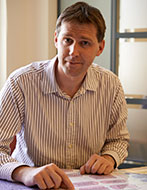| Speakers: |
Dr Tom Benton (Principal Research Officer, Cambridge Assessment Research Division) |
| Date: |
22 Jun 2018 |
Venue: |
Hughes Hall
Mortimer Road
Cambridge
CB1 2EW
|
| Time: |
09:30
-
12:30
|
| Type: |
Training event |
Fee: |
£70.00 |
This training event will help you to gain a better understanding of the concept of assessment reliability, how it is conceptualised, calculated and how it should be interpreted. It is aimed at those responsible for the development and quality control of assessments.
This event provides an overview of the ways in which the reliability of a test is conceived and calculated. It includes an introduction to the relationship between reliability and classical test theory. The presentation was well structured and thought through. The presenter pitched the level very well and with enthusiasm, and he clearly understood the concepts at a very deep level when asked."
The reliability of marking and reliability relating to the choice of questions included within an examination will both be covered in this training session.
Tom will explore the different ways in which reliability can be presented to an external audience and will invite participants to look at the advantages/disadvantages of each. The session will also explore which factors may affect the reliability of a test.
Course trainer
 Dr Tom Benton
Dr Tom Benton has worked in educational statistics for more than 10 years and is Principal Research Officer in Assessment Research and Development Division, Cambridge Assessment. Prior to joining Cambridge Assessment he worked for the National Foundation for Education Research (NFER) as an expert in the field of statistical analysis. His work at NFER included test development, survey research, programme evaluation, benchmarking and international comparisons.
Tom has been closely involved with a number of large-scale national and international surveys of young people as well as the development and standardisation of numerous educational tests. He has co-authored a report on the subject of assessing reliability which has been published by Ofqual (read the report), and has practical experience of developing reliable ways of measuring attitudes and abilities of interest across a wide range of different subject areas including academic ability, community cohesion, self-efficacy, enjoyment of school, self-confidence and political opinions.